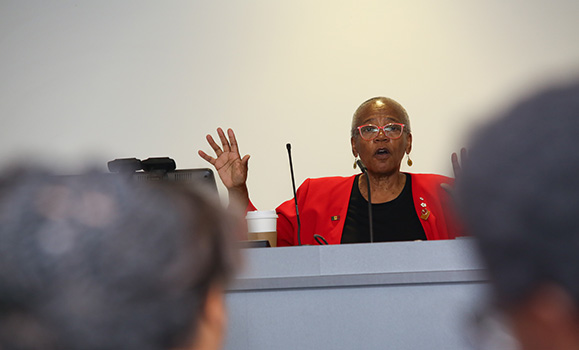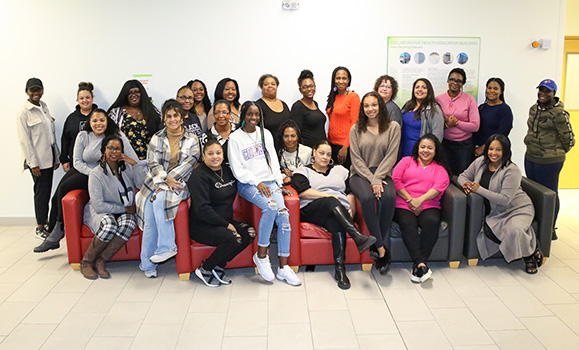A spirit of joy and celebration filled the classroom as Professor Wanda Thomas Bernard╠¤commenced the first in-person class of the new Africentric Bachelor of Social Work (ABSW) Cohort program earlier this fall.
Dr. Thomas Bernard was joined in welcoming the Cohort by Bria Symonds, Africentric Cohort Coordinator; Colin Campbell, Manager, Equity Programs and Initiatives, Department of Health and Wellness; and Judy MacDonald, Director of ┬щ╢╣┤л├╜тАЩs School of Social Work. The pilot program is funded through a partnership between the Department of Advanced Education, the Department of Community Services, the Department of Health and Wellness, and ┬щ╢╣┤л├╜тАЩs Faculty of Health.
ABSW student Shonda Cain chose to pursue a career in social work because of a strong desire to help people and contribute to making positive changes within the Black community. She says she feels blessed to be a part of the first BSW (Bachelor of Social Work) Africentric Cohort, which made her feel immediately comfortable in pursuing her social work education.
тАЬI had many educational challenges previously and when this came up, I thought, this is me, this is my calling. This is what God has been preparing me for,тАЭ she says. тАЬAll of my fears went away. I have a family here, thereтАЩs a unity in which we can do this together; to learn through this important Africentric model. IтАЩm in a space where I donтАЩt have to explain and try to get people to understand where IтАЩm coming from,тАЭ she says.
Shonda says very few organizations and agencies established to help people have this important Africentric lens. тАЬUnderstanding who we are, where we come from, and seeing it in a positive light is very important. I hope it continues to get into the schools, the organizations, the agencies so that people start learning this perspective and applying it to the families and people that they serve.тАЭ
A move towards reconciliation
The project aims to break down barriers, ease pressures on the health care system and create a more robust and diverse social work sector. But its purpose goes deeper than that.
тАЬI see this Africentric Cohort as a form of reparations. When I think about the harm that social work has caused people of African descent for decades, we know that we are trying to do all that we can now to move towards reconciliation, and part of that is about repairing harm,тАЭ says Dr. Thomas Bernard (shown below), who is teaching the first in-person class.

тАЬWhen students have the opportunity to learn in an environment where everyone in the class is from their community, itтАЩs an extraordinary culturally grounded experience. ItтАЩs such an exceptional opportunity because theyтАЩre able to bring their full authentic selves into the classroom. And as an educator, IтАЩm privileged to be able to work with them,тАЭ she adds. тАЬAs the first African Nova Scotian to be hired in a tenure track position at ┬щ╢╣┤л├╜, and now as a Professor Emeritus, to╠¤ have the privilege of teaching this Cohort is not something I would have imagined when I started here in 1990. I certainly would not have thought this was possible in a Canadian school of social work. This is a first; IтАЩm hopeful that it will not be the last.тАЭ
Dr. Thomas Bernard retired from ┬щ╢╣┤л├╜ in 2017, following her appointment to the Senate of Canada.
A supportive style of education
Within the program, 36 students will have tuition and fees paid by the four partners, creating an accessible and culturally informed program that will help address underrepresentation of Black/African Nova Scotians in the social work field. Cohort-based learning allows a group to learn and work their way through a series of courses together, offering a supportive style of education.
The part-time, three-year Cohort is open to Black/African Nova Scotian learners from across the province and learners of African ancestry living in Canada. Participants will learn from ┬щ╢╣┤л├╜ faculty members of African Nova Scotian/African ancestry, using curriculum developed by an Africentric Bachelor of Social Work community-based advisory committee.
The committee includes representatives from the African Nova Scotian Decade for People of African Descent Coalition; the Delmore (Buddy) Daye Learning Institute; ┬щ╢╣┤л├╜тАЩs School of Social Work, Faculty of Health, Transition Year Program, African Nova Scotian Community Engagement, and Promoting Leadership in Health for African Nova Scotians; Department of Community Services; Association of Black Social Workers; Department of Advanced Education; Department of Health and Wellness; Nova Scotia College of Social Workers; and the Africadian Empowerment Academy.
тАЬI would like to express gratitude to the university, government, community, the advisory committee and partners who worked for a number of years to bring this to fruition,тАЭ added Dr. Thomas Bernard. She says thereтАЩs no limit to the success of the program and its participants тАФ now, and for years to come.
тАЬI think the potential is there and I look forward to seeing what happens next.тАЭ

The part-time, three-year Cohort is open to Black/African Nova Scotian learners from across the province and learners of African ancestry living in Canada.
Learn more:╠¤Africentric BSW Cohort

